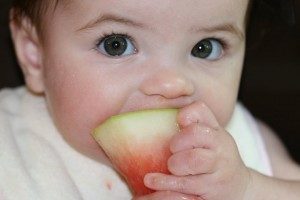When to Introduce Solids
How do you know when is the right time to introduce solids to your baby?
Adding solids to baby’s diet too early can lead to some real trouble. Premature introduction of complementary foods can affect immune function, immunotolerance, the development of chronic disease, and the risk of atopy. Most people feel they should start introducing solids to their infant around 6 months old, but every baby is different.
They all develop at their own rate and there is a huge range of normal. That is why I like to use developmental markers to judge readiness for solids rather than simply biological age.
1. Baby has a strong, independent sit.
Can your baby sit stably on their own? No bumba chair needed. Do they have good stamina with their sit or do they fatigue and flop quickly? Baby needs to have a strong sit before you start introducing solids.
2. Baby has good head control.
She needs the ability to turn away. Having good head control is important for learning how to cough and developing an appropriate choking response. Her neck muscles must have both strength and stamina.
3. Baby is starting to develop fine motor skills.
Is baby grabbing at everything in sight and trying to shove it in his mouth? That’s a good sign. Learning to handle and eat solids will further develop fine motor skills (as in, the ability to grab things precisely and use your fingers efficiently), but there does need to be the start of exploring this type of movement for baby to learn to feed himself.
4. Baby is showing an interest in food.
Is baby watching you eat and is fascinated by food? In terms of social-cultural development, sitting baby at the table with you while you eat can help develop their interest in eating solid food. (Hey mom! This means that you actually need to sit down to eat dinner.)
5. Baby is insatiable.
Are you having a hard time keeping up with your baby’s demand to be fed? For the first while that you introduce solids, food is more about learning skill development and having fun than it is about providing nourishment for your baby. This means that breastfeeding is still the primary fuel source for your baby. (This is why we call solid foods “complementary” during this phase.)
The World Health Organization (WHO) strongly recommends exclusively breastfeeding until baby is 6 months old. They used to say 4 to 6 months, but then the data came back saying that the babies who waited until 6 months were much healthier than those who started at 4 months, so they changed their recommendation to adapt to the new data. Sensible!




